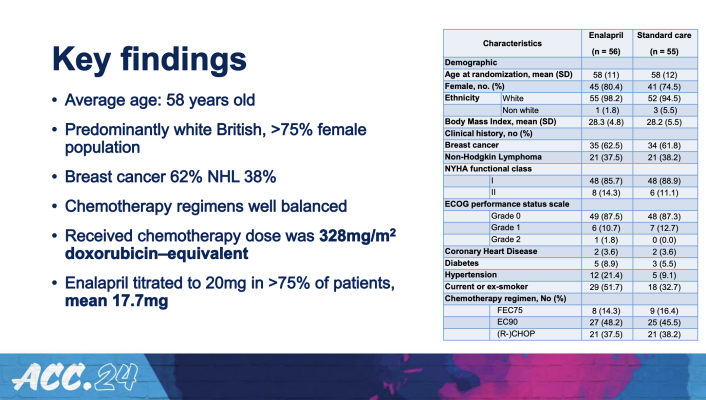
April 9, 2024 — Patients who took an angiotensin-converting enzyme (ACE) inhibitor while undergoing cancer treatment with high-dose anthracycline chemotherapy did not show any difference in troponin T levels, a biomarker associated with heart damage, at one month after their last chemotherapy dose compared with those who did not take an ACE inhibitor, according to a study presented at the American College of Cardiology’s Annual Scientific Session.
The PROACT study reported no impact on cardiotoxicity biomarkers or secondary endpoints related to heart function among patients who took high doses of enalapril, an ACE inhibitor, along with high doses of anthracyclines.

David Austin, MD
“We did not see evidence that we could reduce this biomarker of cardiotoxicity during chemotherapy [with an ACE inhibitor],” said David Austin, MD, consultant cardiologist at the academic cardiovascular unit in James Cook University Hospital, South Tees, Middlesbrough, United Kingdom, and the study’s lead author. “The conclusion from PROACT is that we would not support the adoption of putting enalapril into a standard care preventative pathway in these patients.”
Anthracyclines are a well-established class of cancer drugs that are used to treat several types of cancer. While they are effective at eradicating cancer, they are known to carry a risk of causing damage to the heart muscle. In a small proportion of cases, this cardiotoxicity ultimately leads to heart failure, a condition in which the heart muscle becomes too weak or too stiff to effectively pump blood throughout the body. Previous studies have shown the release of troponin—a group of proteins expressed only by heart muscle cells—during chemotherapy to be a biomarker that is indicative of a higher likelihood of changes in heart function that can lead to symptomatic heart failure later.
To determine whether ACE inhibitors could help to prevent cardiotoxicity, researchers enrolled 111 patients undergoing treatment for breast cancer or non-Hodgkin lymphoma at 13 sites in the U.K. Half of the patients were randomized to receive enalapril and half did not receive enalapril while undergoing chemotherapy. Researchers assessed participants’ troponin levels during their chemotherapy treatment and at one month following their last anthracycline dose.
The study participants were an average of 57 years old and 78% were women; 62% had breast cancer and 38% had non-Hodgkin lymphoma. All patients had negative troponin results at the start of the study, indicating no baseline heart damage. During their cancer treatment, participants received anthracyclines at a mean dose of 328mg/m2 doxorubicin-equivalent. The mean dose of enalapril among those who were randomized to take the ACE inhibitor was 17.7mg.
At the end of the study period, there was no significant between-group difference in the proportion of patients who had experienced a troponin T release, the study’s primary endpoint, which occurred in about 77.8% of those who received enalapril and 83.3% of those receiving standard of care.
There was also no significant difference between groups in terms of troponin I, another type of troponin. However, the researchers said the proportion of patients testing positive for troponin I—47% among those receiving enalapril and 45% among those receiving standard of care—was substantially lower in both groups compared with the proportion testing positive for troponin T.
“That finding itself has implications because guidelines don’t currently differentiate based on type of troponin,” Austin said. “Both have been shown to be associated with cardiotoxicity in observational studies. I was surprised by the difference, and I think this raises the question of what troponin we should be using.”
Outcomes among the two study groups were also similar in terms of left ventricular ejection fraction and left ventricle global longitudinal strain, which are measured with an echocardiogram and used to assess heart function.
Based on the findings, researchers said ACE inhibitors are not likely to play a role in future efforts to prevent cardiotoxicity associated with anthracyclines.
“The field probably needs to find another [drug] candidate before starting again on another preventative study,” Austin said.
The PROACT study will continue to track outcomes in the study participants for at least 12 months. The study was funded by National Institute for Health and Care Research.
For more information: www.acc.org


 July 31, 2024
July 31, 2024 









